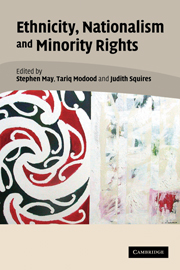Book contents
- Frontmatter
- Contents
- Preface
- List of contributors
- 1 Ethnicity, nationalism, and minority rights: charting the disciplinary debates
- Part I Ethnicity and ethnic groups
- Part II The state and minority claims
- Part III New directions
- 9 Redistribution or recognition? A misguided debate
- 10 Borders, boundaries, and the politics of belonging
- 11 Is it time to be postnational?
- Index
11 - Is it time to be postnational?
Published online by Cambridge University Press: 22 September 2009
- Frontmatter
- Contents
- Preface
- List of contributors
- 1 Ethnicity, nationalism, and minority rights: charting the disciplinary debates
- Part I Ethnicity and ethnic groups
- Part II The state and minority claims
- Part III New directions
- 9 Redistribution or recognition? A misguided debate
- 10 Borders, boundaries, and the politics of belonging
- 11 Is it time to be postnational?
- Index
Summary
In the wake of 1989, talk of globalization was often celebratory. This was true not only among anticommunist ideologues, corporate elites, and followers of Fukuyama's Hegelian announcement of the end of history. Enthusiasm for globalization was also prominent on the left. Even while an anticorporate movement gathered strength, many were eager to proclaim the rise of international civil society as a transcendence of the nation-state. Very few listened to reminders that national struggles in much of the world were among the few viable forms of resistance to capitalist globalization.
Many embraced an ideal of cosmopolitan democracy. That is, they embraced not just cosmopolitan tastes for cultural diversity (which too often rendered culture an object of external consumption rather than internal meaning); not just the notion of hybridity with its emphasis on porous boundaries and capacious, complex identities; and not just cosmopolitan ethics emphasizing the obligations of each to all around the world. They embraced also the notion that the globe could readily be a polis, and humanity at large organized in democratic citizenship. This is an attractive but very elusive ideal.
The discourse of globalization is gloomier early in the first decade of the twenty-first century than it was in the 1990s. Stock market bubbles burst, and even recovery has felt insecure; reviving equity prices have not been matched by creation of jobs. The world's one superpower has announced and implemented a doctrine of preemptive invasion of those it sees as threatening.
- Type
- Chapter
- Information
- Ethnicity, Nationalism, and Minority Rights , pp. 231 - 256Publisher: Cambridge University PressPrint publication year: 2004
- 16
- Cited by



